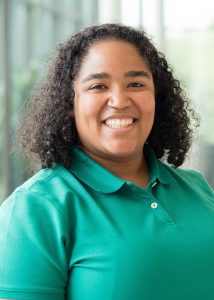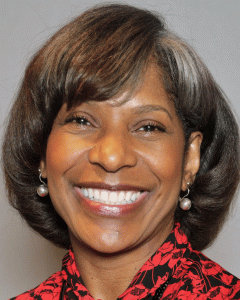Presenter Bios
 Charlotte Baker, DrPH, MPH, CPH is faculty in the Virginia Tech Data and Decisions Destination Area; the PI of the analytic epidemiology I-SPY DATA Lab at the Virginia-Maryland College of Veterinary Medicine; a member of the Faculty of Health Sciences; and faculty in the Virginia-Tech Carilion School of Medicine. Her research lab prioritizes bridging the methodological and data gaps in sports injury research by using advanced statistical analysis and large data sets, especially to address disparities in sport and recreation caused by social and structural determinants of health. A former Epidemic Intelligence Service Officer at the Centers for Disease Control and Prevention, she has more than 15 years of experience in the evaluation and assessment of both original and secondary data to address public health problems; community-based experience that directly addresses a variety of health problems within minority and underserved populations; and directing and managing data analysis with and for collaborators. She collaborates with the Virginia-Tech Carilion School of Medicine to design and implement interprofessional health equity and health disparity educational activities.
Charlotte Baker, DrPH, MPH, CPH is faculty in the Virginia Tech Data and Decisions Destination Area; the PI of the analytic epidemiology I-SPY DATA Lab at the Virginia-Maryland College of Veterinary Medicine; a member of the Faculty of Health Sciences; and faculty in the Virginia-Tech Carilion School of Medicine. Her research lab prioritizes bridging the methodological and data gaps in sports injury research by using advanced statistical analysis and large data sets, especially to address disparities in sport and recreation caused by social and structural determinants of health. A former Epidemic Intelligence Service Officer at the Centers for Disease Control and Prevention, she has more than 15 years of experience in the evaluation and assessment of both original and secondary data to address public health problems; community-based experience that directly addresses a variety of health problems within minority and underserved populations; and directing and managing data analysis with and for collaborators. She collaborates with the Virginia-Tech Carilion School of Medicine to design and implement interprofessional health equity and health disparity educational activities.

Karen Eley Sanders serves as Associate Vice Provost for College Access at Virginia Tech and was the inaugural Chief Diversity Officer for Virginia Tech Carilion School of Medicine from 2014-2020. She has worked in higher education as a counselor, administrator, and faculty member for almost three decades. Karen joined the Virginia Tech community in 2001 as director of the Center for Academic Excellence, and later served as Associate Vice Provost for Student Success and Interim Vice President for Diversity and Inclusion. In 2016, Sanders established a new organizational unit dedicated to college access for underserved communities in the Commonwealth. At Virginia Tech’s medical school, Karen led efforts to foster an environment that appreciates individual differences, values equal opportunity for all, promotes equity, and eliminates barriers to access and success for students, faculty and staff.
In 2013 she received a Gubernatorial appointment to serve on the Commonwealth of Virginia Brown v. Board of Education Scholarship Awards Committee, and has served on this committee for three consecutive Virginia governors. Karen is a lifetime member of the National Association for the Advancement of Colored People (NAACP) and has chaired youth and education initiatives for the Montgomery County/Radford City/Floyd County chapter. She is also a lifetime member of Delta Sigma Theta Sorority, Inc., the nation’s largest predominately Black sorority with more than 250,000 college-educated women. Karen serves on the sorority’s National Program Planning and Development Committee, and she also chairs educational development initiatives for the Roanoke/New River Valley chapter.
She earned a B.S. and M.S. in Psychology from Virginia State University and a doctorate in Adult and Developmental Education from the University of Arkansas, Fayetteville. She is also earned a certified developmental education specialist degree through the Kellogg Institute at Appalachian State University.
Related
 Charlotte Baker, DrPH, MPH, CPH is faculty in the Virginia Tech Data and Decisions Destination Area; the PI of the analytic epidemiology I-SPY DATA Lab at the Virginia-Maryland College of Veterinary Medicine; a member of the Faculty of Health Sciences; and faculty in the Virginia-Tech Carilion School of Medicine. Her research lab prioritizes bridging the methodological and data gaps in sports injury research by using advanced statistical analysis and large data sets, especially to address disparities in sport and recreation caused by social and structural determinants of health. A former Epidemic Intelligence Service Officer at the Centers for Disease Control and Prevention, she has more than 15 years of experience in the evaluation and assessment of both original and secondary data to address public health problems; community-based experience that directly addresses a variety of health problems within minority and underserved populations; and directing and managing data analysis with and for collaborators. She collaborates with the Virginia-Tech Carilion School of Medicine to design and implement interprofessional health equity and health disparity educational activities.
Charlotte Baker, DrPH, MPH, CPH is faculty in the Virginia Tech Data and Decisions Destination Area; the PI of the analytic epidemiology I-SPY DATA Lab at the Virginia-Maryland College of Veterinary Medicine; a member of the Faculty of Health Sciences; and faculty in the Virginia-Tech Carilion School of Medicine. Her research lab prioritizes bridging the methodological and data gaps in sports injury research by using advanced statistical analysis and large data sets, especially to address disparities in sport and recreation caused by social and structural determinants of health. A former Epidemic Intelligence Service Officer at the Centers for Disease Control and Prevention, she has more than 15 years of experience in the evaluation and assessment of both original and secondary data to address public health problems; community-based experience that directly addresses a variety of health problems within minority and underserved populations; and directing and managing data analysis with and for collaborators. She collaborates with the Virginia-Tech Carilion School of Medicine to design and implement interprofessional health equity and health disparity educational activities.